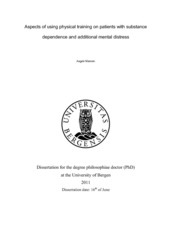| dc.contributor.author | Mamen, Asgeir | |
| dc.date.accessioned | 2011-07-19T09:33:55Z | |
| dc.date.available | 2011-07-19T09:33:55Z | |
| dc.date.issued | 2011-06-16 | eng |
| dc.identifier.isbn | 978-82-308-1791-9 | eng |
| dc.identifier.uri | https://hdl.handle.net/1956/4850 | |
| dc.description.abstract | Physical fitness and mental health were assessed in 47 persons with substance dependence and additional mental distress when they started on a training project. After an average of 11 months in the project, the 36 remaining subjects (33 with sufficient data) were similarly assessed upon discharge. Direct measurements of maximal aerobic power and a lactate profile test at inclusion served as baseline and basis for the design of individual training programmes. The maximal aerobic power was higher than that previously reported for alcohol-dependent subjects, 37 ml• kg-1•min-1 (Paper I), but still subnormal relative to the age-matched normal healthy population. The training programme included “training partners”, who trained together with the participants. The training load varied from 150 to 500 h. The increase in maximal aerobic power was a modest 5%, but lactate threshold performance improved rather more, by 11% (Paper II). Nineteen persons responded to the training, improving maximal aerobic power by 13% and lactate threshold performance by 16%. The remaining 14 did not improve in physical fitness. The only significant difference between these two groups was the percentage of training performed at high intensity above threshold heart rate, 32% for responders compared to 18% for non-responders. Measurements of mental distress in terms of anxiety, depression, social phobic symptoms, general psychiatric problems, alcohol dependence and drug addiction were administered at inclusion and discharge, revealing a substantial level of mental distress at the outset. The discharge data showed reductions in all measures of mental distress, but no significant change in measures of alcohol dependence and drug addiction. The magnitude of improvement in mental distress paralleled the improvement in physical fitness (Paper III). The study shows that substance-dependent persons are capable of performing a high volume of training for an extended time. The use of training partners, a direct test of maximal aerobic power and a lactate profile test all proved feasible for this group of patients. | en_US |
| dc.language.iso | eng | eng |
| dc.publisher | The University of Bergen | eng |
| dc.relation.haspart | Paper I: Journal of Sports Medicine and Physical Fitness 49(2), Mamen, A. and Martinsen, E.W., The aerobic fitness of substance abusers voluntary participating in a rehabilitation project, pp. 187-193. Copyright 2009 Edizioni Minerva Medica. Published version. Full text not available in BORA due to publisher restrictions. The published version is available at: <a href="http://www.minervamedica.it/en/journals/sports-med-physical-fitness/article.php?cod=R40Y2009N02A0187" target="blank"> http://www.minervamedica.it/en/journals/sports-med-physical-fitness/article.php?cod=R40Y2009N02A0187</a>. | eng |
| dc.relation.haspart | Paper II: European Journal of Sport Science 10(4), Mamen, Asgeir. and Martinsen, Egil W., Development of aerobic fitness of individuals with substance abuse/dependence following long-term individual physical activity, pp. 255-262. Copyright 2010 European College of Sport Science. Published version. Full text not available in BORA due to publisher restrictions. The published version is available at: <a href="http://dx.doi.org/10.1080/17461390903377126" target="blank">http://dx.doi.org/10.1080/17461390903377126</a>. | eng |
| dc.relation.haspart | Paper III: European Journal of Sport Science 11(4), Mamen, A.; Pallesen, S.; and Martinsen, E.W., Changes in mental distress following individualized physical training in patients suffering from chemical dependence, pp. 269–276. Copyright 2011 European College of Sport Science. Published version. Full text not available in BORA due to publisher restrictions. The published version is available at: <a href="http://dx.doi.org/10.1080/17461391.2010.509889" target="blank">http://dx.doi.org/10.1080/17461391.2010.509889</a>. | eng |
| dc.title | Aspects of using physical training on patients with substance dependence and additional mental distress | eng |
| dc.type | Doctoral thesis | |
| dc.rights.holder | Copyright the author. All rights reserved | |
| dc.rights.holder | The author | eng |
| dc.subject.nsi | VDP::Social science: 200::Psychology: 260 | eng |
| dc.subject.nsi | VDP::Social science: 200::Social science in sports: 330::Other subjects within physical education: 339 | eng |
